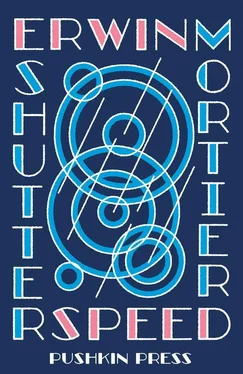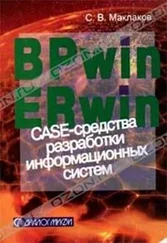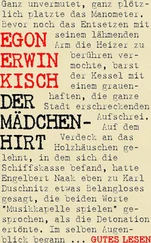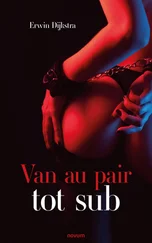The girl sauntered over the terrace towards Aunt, shook her hand and curtsyed prettily. She repeated the ritual with Miss van Vooren, but when it was my turn she merely said ‘Oh, bonjour’ with an almost imperceptible nod at me, and returned to her dolls.
‘Sa propre famille,’ Hélène Vuylsteke said in a placatory tone. ‘They won’t let her out of their sight …’
She invited us to sit down, and proceeded to pour coffee. I could see my face idiotically distorted in the silver coffeepot when she filled my cup. In the centre of the table glistened two strawberry cakes layered with transparent jelly.
‘Cut the cake for us, will you, Rosa,’ said Hélène.
The girl was served her portion on a separate platter which she carried to her assembly of dolls, where she divided it among four toy plates.
A lively conversation ensued on that side of the terrace, in the course of which the girl put on a different voice for each of her playmates.
At our table Hélène conversed primarily with Miss van Vooren, rattling away in a French that I could tell Aunt was at pains to follow. She was not at ease.
‘Enjoy your cake did you, Joris?’ she asked, in an attempt to feel she was part of it all.
‘Yes, Aunt. I’m mad about strawberries.’
I looked out over the lawn stretching towards the pond. A peacock with fanned tail-feathers stepped out from the undergrowth and went in pursuit of a hen. Further off, among the stands of trees, the dew of the past night lingered in damp veils between the bundles of hay, swathing the view in a bluish haze that brought the world to a standstill. Even the swans gliding almost imperceptibly on the pond settled their long necks back to rest between their wings.
At the end of the alleyway the tower clock struck three, followed almost immediately at our backs by a low rumble of mechanisms gearing up all over the house, as if an immense swarm of butterflies were fluttering up from the cellars. Above the rumble, at intervals of a few seconds, clocks began to chime with neurotic urgency in one room after another. There were tinkly tunes, and also a grandfather clock conducting the orchestra, which seemed to be moving through the premises from south to north for a full half-minute before dying away in the distance.
‘Our Marie,’ said Hélène, smiling. She must have noted the surprise on our faces. ‘She’s getting on in years. When she adjusts the clocks in the house she forgets she’s not quite as nimble on her feet as she used to be. There’s at least a minute’s difference between one end of the house and the other.’
She gazed out over the park. ‘Time passes, passes,’ she sighed. ‘Je trouve ces bois d’une tristesse …’
‘Oh yes, trees can make one very sad,’ said Aunt, determined to contribute to the conversation.
‘Tous ces arbres que nous avons vus si petits …’ mused Hélène. She took a sip of her coffee and seemed lost in thought.
Miss van Vooren coughed. ‘I’ve caught a summer cold,’ she said, clearing her throat. ‘They’re the worst.’
Hélène Vuylsteke noticed my boredom.
‘I’ll ask Isabella to show you the library,’ she said. ‘You like reading, do you?’
‘Reading?’ echoed Aunt. ‘He likes nothing better.’
Hélène called the girl and asked her to take me into the house. Isabella gave a distracted sigh. She put down her napkin, stood up and crossed to the french windows of the adjoining salon, which were open. ‘En avant, venez avec moi.’
I trailed after her as she crossed the salon to the door opening on to the hall, where a staircase with cool marble steps curved upwards beside concave walls. Above the plaster mouldings a host of Van Callants gazed down at me, row upon row of them in gilt picture frames reaching all the way up to the ceiling. They were dressed according to the fashions of their day, and had taken on a spun-sugar look where the varnish had yellowed.
The girl was already at the top of the stairs. ‘Viens, dépêche-toi, ils sont tous morts et pas intéressants …’
She ran down the long hallway and stopped at a door at the far end. A dry smell of leather and wood wafted towards me as she pushed it open.
Looking past her I saw books with brown, ridged spines. The light in the room was tempered by partially lowered blinds.
‘Entre,’ said the girl.
I did so, and the door fell to behind me. She had left me on my own.
I clumped over the floorboards until my footsteps were smothered in ankle-deep carpet. There were two leather armchairs by the hearth, and a half-smoked cigar lay dead in an ashtray on a salver.
All about the room were tables on which rested open books as long as my arm. I went over to look.
On one frontispiece the inscription read ‘ The Glory of Flanders ’, beneath a lion holding the Van Callant escutcheon aloft. I turned the page gingerly, using both hands, and found myself looking at a map upon which, after a moment’s scrutiny, I discovered the village, half obscured by a circle of damp. Its name was written as ‘Stuvenberga’, and I could make out the church, and slightly further up, in a bend of the stream, the original castle with ramparts and gardens laid out in a grid.
On the other side of the table lay a volume even bigger than all the others. It was an atlas open at a page showing a map of the world with continents in many colours, as garish as a parrot’s feathers, and an inscription in fancy lettering: Recens et Integra — Orbit Descriptio .
I recognised France and Spain. The shapes were familiar, but here their coastlines jutted far more raggedly into the ocean than on the wall maps in Mr Snellaert’s classroom, as if they had been drawn by a child’s unsteady hand, and also the world itself looked more like an apple than a globe. It was flanked by seraphim holding back draperies, which, it seemed, they would let fall when there were no spectators, so as to keep the earth from fading.
I was so engrossed in the map that I was taken completely by surprise when the tabletop juddered. I looked up to find Isabella Van Callant staring into my eyes.
She had climbed on to the table without a thought for the books, and was on her knees facing me. She said nothing, but wore a beatific smile which made me very nervous.
I dropped my eyes and, for want of something to do, made to turn the page with the map of the world. Just as I placed my other hand on the facing page to avoid all risk of dog-earing, the girl quickly raised the back cover of the atlas, clapped it shut on my hands and brought both her knees down on top.
My hands were imprisoned.
‘Let me go!’ I cried.
‘Quoi?’ she sneered.
She reached out and pulled the hair on my forehead, then grabbed me roughly by the chin.
‘Regarde-moi, fermier …’ she said, bringing her face close to my mine. So close that I could see the brown of her irises flecked with blue and grey and green, shards from all those varnished eyes looking out from the portraits in the stairwell. There were freckles on her nose and on her cheeks.
‘Petit de Stuyvenberghe,’ she hissed, ‘tu es mon prisonnier.’
‘Laissez-moi,’ I wailed. My hands were turning numb and the edges of the atlas cut painfully into my forearms under her weight.
She grinned and came even closer. I could feel her breath on my cheeks.
Suddenly she seized the back of my head with both hands and pulled me to her.
Her lips squelched against mine. It was utterly revolting, and I nearly gagged at the sourish taste of her darting tongue while her breath howled in my ears.
She let go of me, drew back a little and regarded me with grim triumph in her brown eyes.
My chin was wet with her saliva and I couldn’t wipe it off.
Читать дальше












